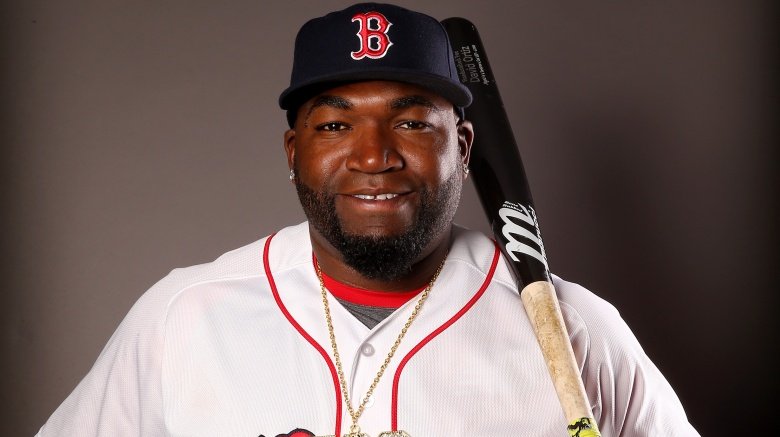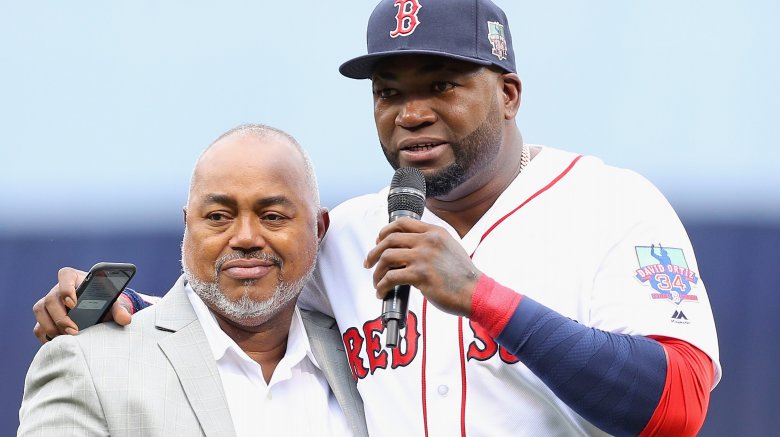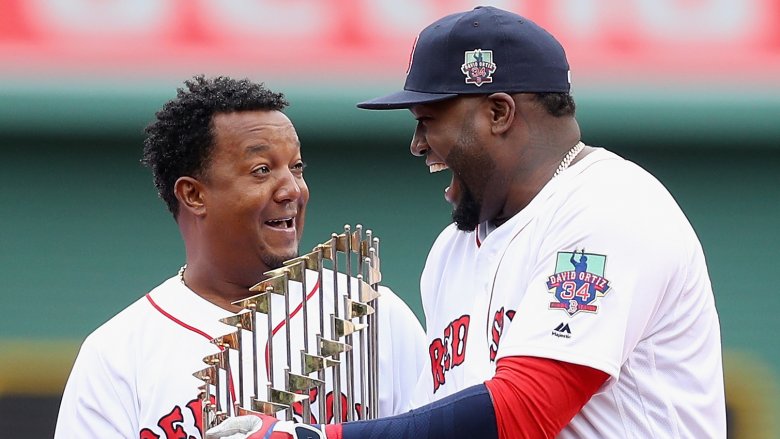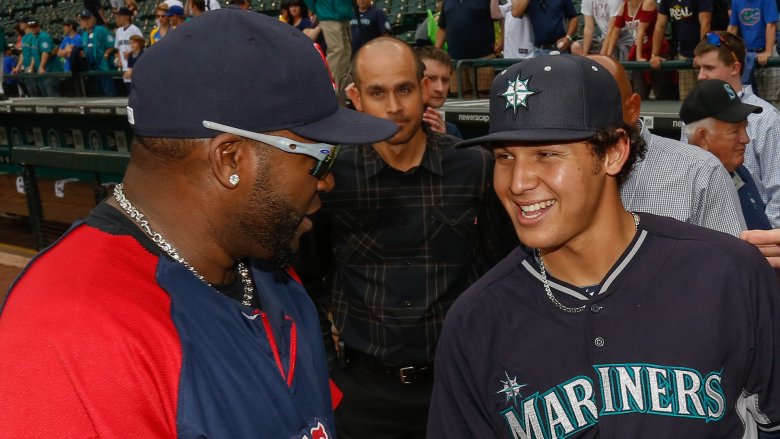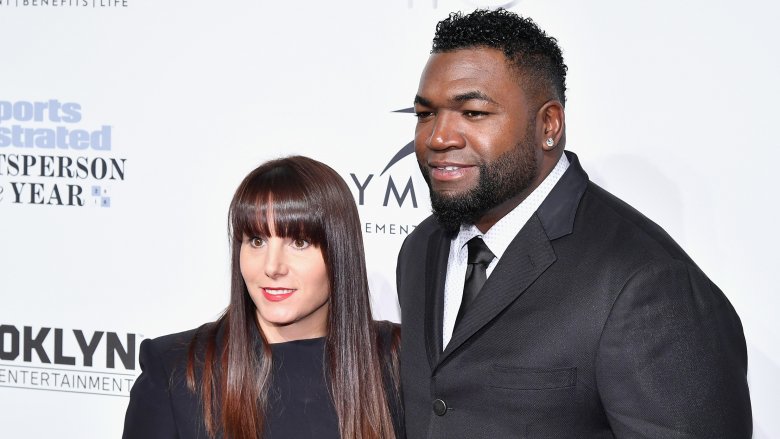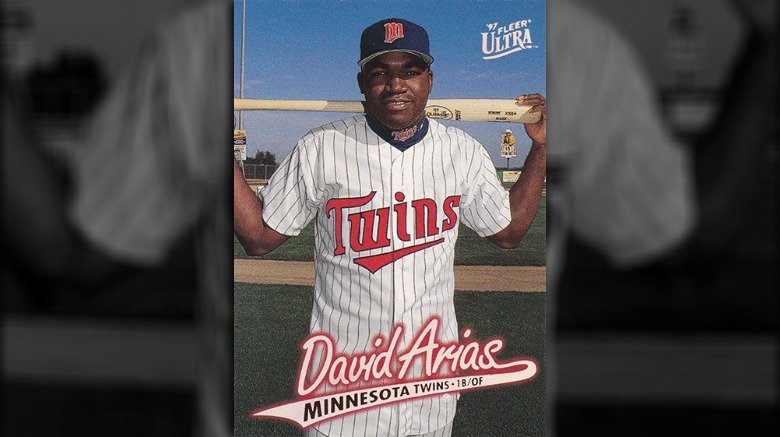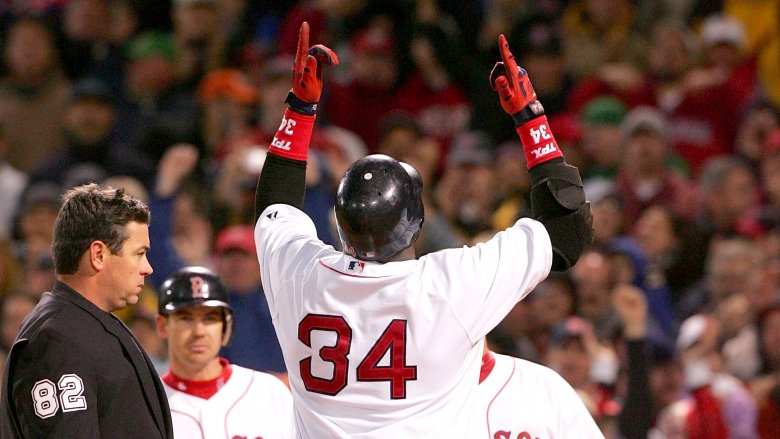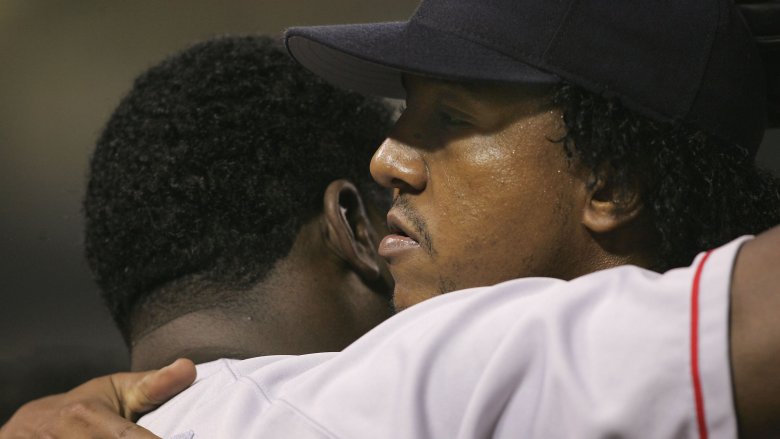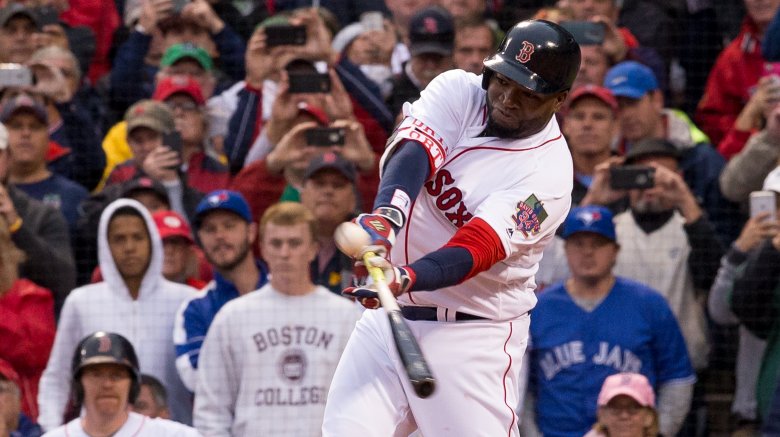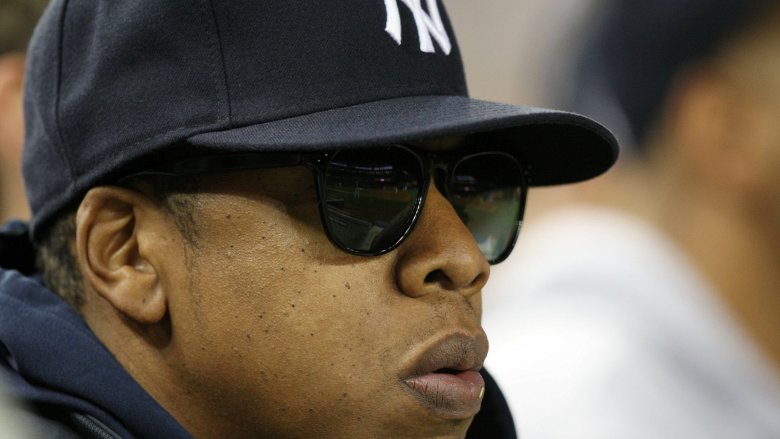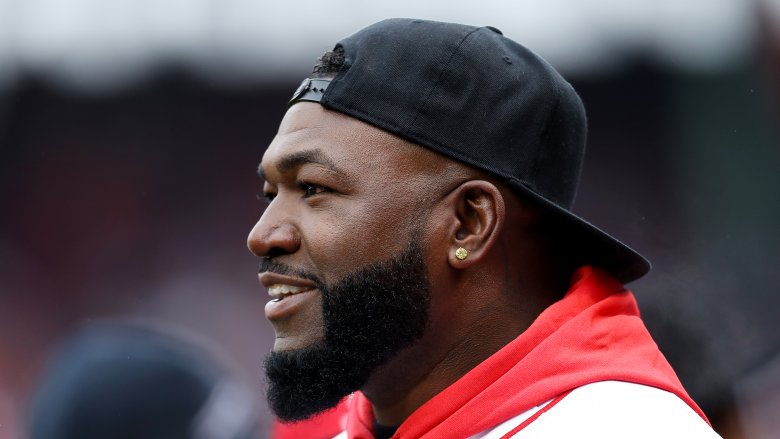The True Story Behind David Ortiz
Charming, affable, David Ortiz is one of the most recognizable and likable figures in Major League Baseball's modern history. As the unofficial face of the Boston Red Sox — and officially one of its most consistently valuable players as a one-man hit, run, and home run factory — Ortiz led the formerly and possibly cursed Beantown squad to a World Series title in 2004, ending an agonizing 86-year championship drought. Then he helped the team win two more, in 2007 and 2013.
But all good things must come to an end. After 20 years in the majors, the popular and accomplished Ortiz retired in 2016. In all that time in the spotlight, how much did fans really know about the guy? He's lived an interesting and colorful life, both on the diamond and off. Here's a look into the strange, true story behind the legend that is David Ortiz, aka "Big Papi."
Baseball is in his blood
David Ortiz comes by his love of baseball naturally — the old ball game was once the family business. Ortiz was born and raised in the Dominican Republic, where his father, Enrique "Leo" Ortiz (pictured), played professional and semi-pro baseball back in the 1970s. The elder Ortiz was apparently good, but not great, better at fielding than hitting. So he never moved up to Major League Baseball in the United States, where the teams require players to be just as good at offense as they are on defense. Of course, they don't require that for designated hitters, who hit but never take the field with a mitt. At any rate, David Ortiz never got to see his father play. When little Big Papi was born, Leo Ortiz quit his diamond dreams in order to find a job more steady than baseball to support his growing family. Good on you, dad.
His idol was later his teammate
David Ortiz played alongside fellow Dominican baseball legend Pedro Martinez on the Boston Red Sox from 2003 to 2005. Martinez is just four years older than Ortiz, but when you're a kid, a few years can make a world of difference. Growing up as an aspiring baseball player in Santo Domingo, Dominican Republic, Ortiz came up after both Martinez and the pitcher's older brother, Ramon Martinez. The elder Martinez went on to pitch in the majors from 1988 to 2001, but in the Dominican Republic he became a celebrity when he took the mound for the country's national team at the 1984 Summer Olympics at just 16 years old. David and Pedro became close friends during their overlapping, mid-2000s, championship-producing tenure with the Red Sox, meaning Ortiz got to meet his hero and become his peer. Had Ortiz shipped up to Boston just a couple of years earlier, he could've played alongside his other hero, Ramon Martinez, who closed out his career with the Red Sox.
The few, the proud, the Mariners
While most commonly associated with the Boston Red Sox — because that's where he played during his years of peak productivity and won a few World Series titles — it's easy to forget that David Ortiz spent six seasons with the Minnesota Twins. But his big-league career had one more stop before the Twin Cities: Seattle.
The Mariners signed Ortiz before anyone else could, and he was playing by the time he turned 18. He needed a little development before he could join the team proper, and he lit up their minor league farm system. Clearly, he was destined for big things, but the Mariners already had veteran players entrenched at Ortiz's preferred positions, first base and in the designated hitter slot (Paul Sorrento and Edgar Martinez, respectively), so Ortiz became the "player to be named later" in an outstanding deal with the Twins. And so, just like they did with Alex Rodriguez, the Mariners had a young star under contract and got rid of him before he became a baseball legend.
He's into the Pack, man
While working his way through the Seattle Mariners organization, David Ortiz enjoyed a stint with the Wisconsin Timber Rattlers, the team's affiliate at the time in the single-A Midwest League. Finding himself in the mid-American wonderland of Wisconsin, Ortiz bloomed where he was planted, took a look around, and fell hard for what would become two of the biggest loves of his life: Wisconsin cheddar, and cheese curds. Okay, not cheese exactly, but Ortiz did become a "cheesehead," as in a hardcore fan of the Green Bay Packers. The Rattlers play about half an hour away from Green Bay, so he couldn't help but come across the area's tight-knit collective of hardcore, cheese-hat-wearing Packers fans.
He was formally indoctrinated by the future Tiffany Ortiz, a Wisconsin native and thus a lifelong Packers acolyte. The Ortiz family reportedly regularly attended games at Lambeau Field, although possession of the season tickets was probably tense for a little bit. In 2013, David and Tiffany Ortiz announced that they planned to formally separate, but they ended up getting back together a year later.
David who?
There are some baseball cards floating around out there that bear the image of a guy who looks exactly like Big Papi going by the name of David Arias. Well, that actually is Big Papi: His full, legal name is David Américo Ortiz Arias. In the Dominican Republic, where the slugger was born, it's customary to take on both the maternal family name as well as the paternal one. (In the U.S., generally just the father's name is passed down to the next generation.) Rather than use two last names in the world of American baseball, Ortiz initially went by only his maternal last name (Arias) as an up-and-comer in the Mariners organization, rather than his paternal surname (Ortiz). When he was traded from Seattle to Minnesota, he decided to mark his new direction in life by officially changing his last name ... or rather just choosing to emphasize his other last name.
This one's for you, Mom
David Ortiz may have decided to use his paternal name professionally, but it wasn't out of any disrespect to his mother. On the contrary, he was always very close to his mother, Angela Rosa Arias. Tragically, though, she was killed in a car accident in January 2002 at the young age of 46. That means she never got to see her little guy emerge from his low-key years in Minnesota to become a superstar who won three World Series championships with the Boston Red Sox, the first coming just over two years after her death.
She remained on Ortiz's mind, of course, especially when he was playing. Following her untimely death, he decided to honor her memory on the field in a subtle but touching way. Every time Ortiz hit a home run in the seasons after she died, he would point to the sky with both hands as he trotted around the bases. "I do it normally, just to thank God and thanks to my mom, too," Ortiz told USA Today. (With 541 career home runs, he honored Mom on a regular basis.) His uniform sleeves covered it up, but Ortiz also paid tribute to his mother with a tattoo of her on his arm.
Thanks, Pedro!
David Ortiz had a rough 2002 season with the Minnesota Twins. He missed nearly 40 games due to knee injuries — playing on artificial turf in an indoor ballpark is hard on the bones and joints. At the end of the season, Ortiz's contract with the Twins was up for renewal, but that would come with the complicated but potentially lucrative notion of salary arbitration. Ortiz's salary could have ballooned overnight if the Twins decided to keep him around for the 2003 season and beyond. In retrospect, it would've been worth every penny to the organization if he had helped bring them as many championships as he would to Boston, but the Twins didn't want to spend the money at the time. And so, they cut Big Papi.
His friend, Red Sox pitcher Pedro Martinez, wrote in the Players' Tribune about witnessing the moment when Ortiz received the phone call in a Dominican Republic restaurant informing him of his unemployment. "I jumped in the air and clapped," Martinez said. "We needed a first baseman in Boston, and I knew that could be David." Martinez says he then put in a call to the Red Sox front office and personally advised the staff to sign Ortiz. And they did.
The needle and the damage done?
What do most of Major League Baseball's most prolific home run hitters of the late '90s and early 2000s have in common? Links to forbidden, performance-enhancing drugs — Mark McGwire, Jason Giambi, and Barry Bonds were all alleged to have doped up to get huge, homer-hitting muscles. But what about David Ortiz, a similarly bulky ballplayer who hit more than 500 home runs in his career? In 2009, the New York Times published an article citing "lawyers with knowledge of the results" who claimed that Ortiz's name was on a 2003 list of big-league ballplayers who had failed a drug test.
About a week later, Ortiz denied the allegations at a New York press conference, while acknowledging the legal and moral grey area of nutritional supplements. "I definitely was a little bit careless back in those days when I was buying supplements and vitamins over the counter — legal supplements, legal vitamins over the counter — but I never buy steroids or used steroids," Ortiz said. He also shared that he'd been tested for illegal substances more than a dozen times since 2003 and had never had a positive result. Ortiz's name has never been linked to any steroid use since, nor has any evidence ever been found linking him to performance-enhancing drugs.
This is 40
As one of the biggest stars in the storied history of the Boston Red Sox, Big Papi has necessarily had a few dramatic on-the-field showdowns with the team's biggest rival, the New York Yankees. But his biggest actual beef involved a very different Big Apple institution: Jay-Z, rapper, entrepreneur, and Beyoncé's husband. It all comes down to nightclubs. Back in the 2000s, Big Papi invested some of his baseball fortune in a Dominican Republic establishment called Forty-Forty.
Well, Jay-Z also has a nightclub business — a similarly named small chain of hotspots called The 40/40 Club. "Forty-Forty" (or 40/40) is a bit of baseball slang, referring to the relative handful of versatile players to have hit 40 home runs and stolen 40 bases in the same season. And while his club bears that name, Ortiz never became a member of that baseball club. (He stole only 17 bases in his entire career.) Jay-Z never even played pro baseball, although he did rack up more than 40 "top 40" hits. Jay-Z sued Ortiz for $5 million, alleging that the latter's nightclub name infringed on his club's name. The two settled the trademark infringement suit out of court in 2011. Beef squashed.
He was nearly murdered
David Ortiz likes to hit the clubs in the Dominican Republic, and on the evening of June 9, 2019, he visited the Dial Bar and Lounge, an establishment in eastern Santo Domingo. That's where a man approached the baseball legend, and, from just a few feet away, shot him in the back.
Ortiz was taken to a hospital there, where doctors had to remove damaged parts of his gall bladder and intestine, while keeping an eye on his liver as he recovered in an intensive care unit. The rest of his medical treatment came at Massachusetts General Hospital in Boston — Ortiz's old team, the Red Sox, paid to have their star airlifted out of the Dominican Republic. He subsequently endured a second surgery, but less than two days later, his wife, Tiffany Ortiz reported that her husband was "stable, awake, and resting comfortably" in the ICU.
Within the week, the Dominican Republic's national police director Ney Aldrin Bautista Almonte announced that seven suspects connected to the crime had been identified, and six had been arrested. The motive behind the act of violence against Ortiz: The group had been offered 400,000 Dominican pesos (about $8,000) to kill Big Papi. Thankfully, it didn't work.
